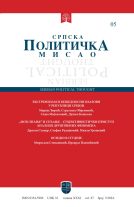- Home page
- Researchers
- Dragan Đukanović
Dragan Đukanović
Institut za međunarodnu politiku i privredu, Beograd

REGIONAL COOPERATION IN THE WESTERN BALKANS – LONG-TERM WAITING FOR MEMBERSHIP IN THE EUROPEAN UNION AND/OR THE “BALKAN UNION”
The genesis of regional cooperation in the Western Balkans over the past two and a half decades has had different stages, with long-term crises and problems related to the development of its own concept. Therefore, in this paper, the authors have analysed its achievements so far, with special emphasis on the period after the transformation of the Stability Pact for Southeastern Europe into the Regional Cooperation Council in 2008, as well as on the attempt to reconceptualize cooperation within the Western Balkans Six in 2013. At the same time, they pay attention to the achievements of the Berlin Process after 2014 and the creation of a new form of transition of regional cooperation to regional economic integration (the Common Regional Market) from the end of 2020. In that context, the authors are considering whether it will come to the deepening of political cooperation through the eventual establishment of the Parliamentary Assembly of the Western Balkans and the introduction of regular meetings of prime ministers and foreign ministers. The authors, therefore, point to certain fears in the region that the already initiated integration in the field of economic cooperation, which would be accompanied by intensified political cooperation, could result in the establishment of the "Balkan Union". This essentially encounters significant resistance and opposition in the Western Balkans region due to the fear that it will become a permanent solution, which as such excludes the membership of the countries of the region in the European Union in the long run.

Current Challenges of the European Integration Process of the Western Balkans Countries
In this article, the authors analyze the most significant achievements of the current dynamics of the accession of the Western Balkans to the EU (Process of Stabilization and Association), with a special emphasis on numerous issues that stand in the “European way” of these countries. In this context, a specific analysis will be linked to numerous internal problems in the Western Balkans countries, as well as in their bilateral relations, and how does this affect the possible acceleration of the European integration process. Of course, the authors in this paper devoted considerable attention to the role of “non-EU” countries in the region of the Western Balkans, especially the Russian Federation, the Republic of Turkey and the People's Republic of China. Also, the presentation will discuss how the countries of the Western Europe, which obviously will remain dominant in the European Union in the next period (Germany, France and Italy) will position themselves concerning a new enlargement of the EU to the Western Balkans. Also, the unfinished process of Brexit (2016) opens up some problems when it comes to the entering the countries of the Western Balkans into the European Union. Certainly, there are some "weak points" in the European integration process of the Western Balkans countries (corruption and organized crime in the case of Montenegro, relations with the government in Pristina when it comes to Serbia, etc.).

Geostrategic and International Legal Determinants of the Croatian Dominance in the Eastern Adriatic
In the course of the article authors examine foreign policy activities of the Republic of Croatia regarding the delimitation processes with their ex-Yugoslav neighbors, Slovenia, Bosnia and Herzegovina and Montenegro, in the Adriatic region. Authors start from the thesis that Croatia’s aim is to reach a position of strategic dominance in the Eastern Adriatic Sea through these processes. Croatia is interpreting international legal rules on maritime delimitation narrowly and distortedly, and disregards principles of equity and good-neighborliness. It also relies upon historic titles that have no basis in the practice of delimitation of former Yugoslav republics. At the same time vital interests of its neighbors for equitable results in these delimitations is in stark contrast with Croatia’s negligible gains for its economy which would proceed from delimitation favored by Croatia. From all these arguments authors conclude that the primary motivation for Croatia’s arguments in territorial delimitation processes in the Eastern Adriatic region is not the preservation of equitable application of international law principles, the preservation of good relations with neighbors or the status quo in view of wider integration processes, but a wish to reach a position of geostrategic dominance through comparative weakening of geostrategic positions of its respective neighbors.
